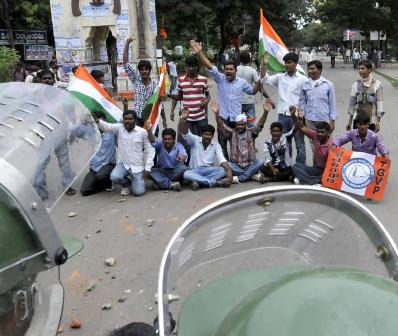New Delhi, Jun 13: Ten days after recording two lakh COVID-19 cases, India surpassed the three lakh-mark on Saturday with the worst daily spike of 11,458 infections, while the death toll too climbed to 8,884 with 386 new fatalities, the Union Health Ministry said.
India took 64 days to cross the 1 lakh-mark from 100 cases, then in another fortnight it reached the grim milestone of two lakh cases. It has now become the fourth worst-hit nation by the pandemic with a caseload of 3,08,993, according to coronavirus statistics website Worldometer.
However, the Health Ministry said on Friday the doubling time of coronavirus cases has improved to 17.4 days from 15.4 days. And its data updated at 8 am on Saturday showed active cases at 1,45,779 and those who have recovered at 1,54,329; one patient has migrated.
"Thus, around 49.9 per cent patients have recovered so far," a ministry official said.
The total number of confirmed cases include foreigners.
Of the 386 new deaths, Delhi accounted for the highest 129 fatalities followed by Maharashtra 127. The virus is moving rapidly in Delhi, which for the first time reported over 2,000 cases on Friday, and Maharashtra, where the number of cases has crossed one lakh.
Gujarat reported 30 deaths, Uttar Pradesh 20, Tamil Nadu 18, West Bengal, Telangana and Madhya Pradesh 9 each, Karnataka and Rajasthan 7 each, Haryana and Uttarakhand 6 each, Punjab 4, Assam 2, Kerala, Jammu and Kashmir and Odisha 1 each.
Of the total 8,884 deaths, Maharashtra tops the tally with 3,717 fatalities followed by Gujarat with 1,415, Delhi with 1,214, West Bengal with 451, Madhya Pradesh with 440, Tamil Nadu with 367, Uttar Pradesh with 365, Rajasthan with 272 and Telangana with 174 deaths.
The death toll reached 80 in Andhra Pradesh, 79 in Karnataka, 70 in Haryana and 63 in Punjab. Jammu and Kashmir has reported 53 COVID-19 fatalities, Bihar 36 and Uttarakhand 21, Kerala 19, Odisha 10 and Jharkhand and Assam 8 each.
Chhattisgarh and Himachal Pradesh have registered 6 deaths each, Chandigarh 5, Puducherry 2, while Meghalaya, Tripura and Ladakh 1 each, according to the health ministry.
Maharashtra has reported the maximum number of cases at 1,01,141 followed by Tamil Nadu (40,698), Delhi (36,824), Gujarat (22,527), Uttar Pradesh (12,616), Rajasthan (12,068) and Madhya Pradesh (10,443).
The number of COVID-19 cases has gone up to 10,244 in West Bengal, 6,516 in Karnataka, 6,334 in Haryana and 6,103 in Bihar. It has risen to 5,680 in Andhra Pradesh, 4,730 in Jammu and Kashmir, 4,484 in Telangana and 3,498 in Odisha and Assam each.
Punjab has reported 2,986 cases while Kerala has 2,322 cases.
A total of 1,724 people have been infected by the virus in Uttarakhand, 1,617 in Jharkhand, 1,424 in Chhattisgarh, 961 in Tripura, 486 in Himachal Pradesh, 463 in Goa, 385 from Manipur and 334 in Chandigarh.
Ladakh has registered 239 COVID-19 cases, Puducherry 157, Nagaland 156, Mizoram 104, Arunachal Pradesh 67, Sikkim 63, Meghalaya 44 while Andaman and Nicobar Islands has registered 38 cases.
Dadar and Nagar Haveli and Daman and Diu together have reported 30 cases.
The ministry said 7,984 cases are being reassigned to states and "our figures are being reconciled with the ICMR". State-wise distribution is subject to further verification and reconciliation, it added.






Comments
Add new comment